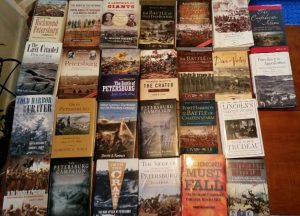Petersburg, the most researched battle of late?
The Petersburg Battlefields Foundation hosted its first stakeholders meeting yesterday to present its strategic plan to potential partners. As the organization’s tourism chair, I planned to spotlight a few new Petersburg publications to illustrate how scholarship on the campaign has really taken off over the last decade. I’d like to hope that as Civil War enthusiasts start to better understand the 292-day campaign they will want to see its sites. After selecting a few of the most recent titles–Will Greene’s A Campaign of Giants, Gordon Rhea’s On to Petersburg, and Steven Sodergren’s The Army of the Potomac in the Overland & Petersburg Campaigns–I decided on a different approach and emptied several full rows of my bookshelf to haul out as a visual statement.

Over two dozen books on the campaign have been published in the last decade. Is there another particular aspect of the Civil War that has received as much scholarship (from reputable publishers) in the last ten years? At the very least, I’ll bet Petersburg outweighs any one campaign, though I invite Gettysburg or Atlanta bibliophiles to prove me wrong. The Petersburg (& Richmond) Campaign of 1864-1865 had certainly missed this kind of extensive study.
For the first 140 years after the American Civil War, the events in between the Overland and Appomattox campaigns proved too baffling for deep research. Many veterans themselves admitted the sheer scope of the campaign was too large for detailed investigation. The campaign showed up here and there, and, when so, it was typically depicted as static trench warfare in between Cold Harbor and Confederate surrender.
Commemorations during the centennial focused on the defense of Petersburg by local units in the Army of Northern Virginia against a constant swarm of besieging Yankees. Such (mis)understandings stripped the soldiers on both sides of any personal agency in determining the outcome. With those on the victorious soldiers reduced to an unending mass of non-autonomous draftees and conscripts (not the case), it is no wonder that few took interest in deeply studying (and touring) Petersburg’s battlefields.
Richard Sommers’s Richmond Redeemed: The Siege of Petersburg (Doubleday & Company, 1981) finally showcased how just one aspect of the campaign–the Fifth Offensive–could be worthy of detailed research. Additional titles appeared in the 1980s-90s, notably Andy Trudeau’s The Last Citadel (Little, Brown and Company, 1991)–the first attempt to give the campaign a one volume treatment–and a half dozen single-topic books in H.E. Howard’s Virginia Civil War Battles and Leaders Series.
Petersburg research really began to take off just before the sesquicentennial. I view Earl Hess’s In the Trenches at Petersburg (UNC Press, 2009) as the single best book to truly understand the campaign’s progress and how Ulysses S. Grant and the Union army utilized both trench warfare and a logistical chess match to neuter the Army of Northern Virginia. As academic presses, both UNC and LSU have refreshingly continued to produce titles concentrated solely on military aspects of the campaign. Savas Beatie meanwhile significantly boosted Petersburg’s audience by reprinting second editions of Richmond Redeemed, The Last Citadel, and a selection of the H.E. Howard series, as well as promoting new work.
There are still a few offensives during the campaign that only have a chapter or essay devoted to them (Hatcher’s Run, Fort Stedman, White Oak Road, Dinwiddie Court House, Fort Mahone, to name a few), leaving opportunity for even more study. But we can finally put to bed the long-held excuse that a lack of material is preventing (potential) visitors from taking interest in the campaign.
I’d be interested to see if anyone can point me to another Civil War campaign that has had as much written in just a ten-year stretch.
Additional information about the Petersburg Battlefields Foundation can be found on its website and Facebook page.
There is my book!
I can say I did it because at the time I was surprised to discover there was no book on the June 15-18 battle outside of Thomas Howe’s Wasted Valor. I wrote it in large part to answer the questions I had after reading Howe’s work.
The fact that there is no book on Fort Stedman is surprising.
We still need more Petersburg.
And there’s my book too!
Like Sean Chick, I was prompted to write my book after I read someone else’s work. J. Tracey Power’s Lee’s Miserables provided an excellent analysis of how Confederate soldiers endured the Overland and Petersburg campaigns, but it made me wonder about how Union soldiers, the nominal “victors” of both campaigns, got through it all.
If I may posit another theory, perhaps some of this new research stems, consciously or unconsciously, from the centennial of the First World War. The linkages between Petersburg and trench warfare in WWI have been repeatedly debated by the historical community, and perhaps the rush of new literature for the WWI centennial has spilled over into renewed interest in Petersburg studies.